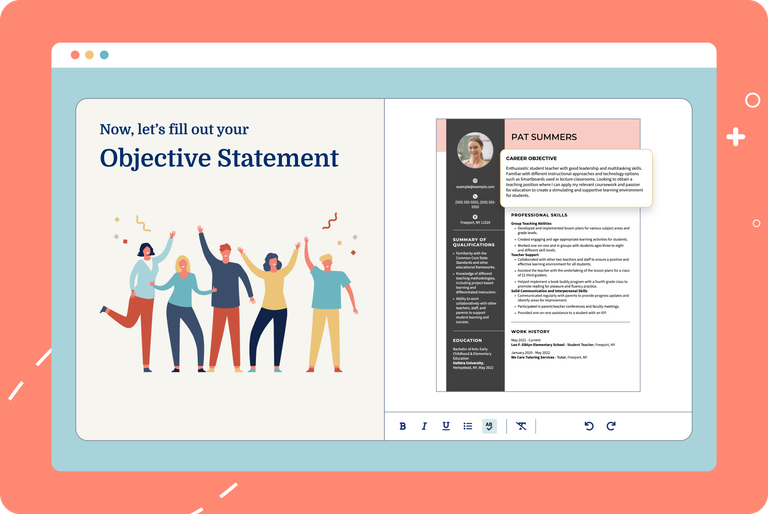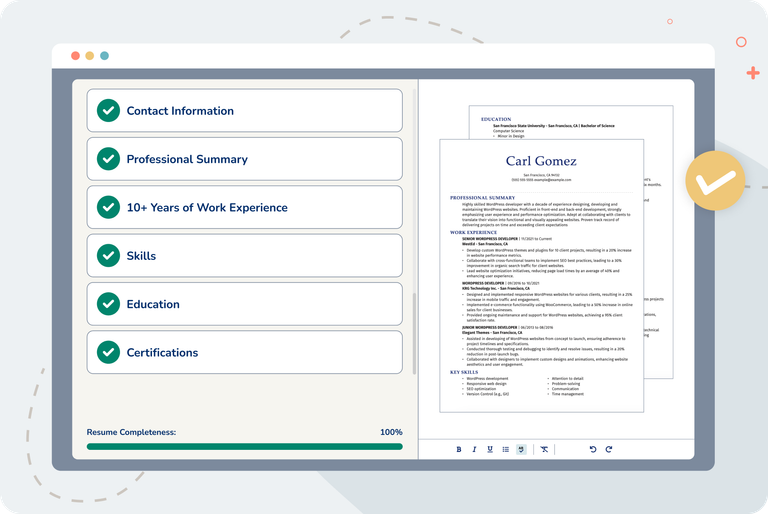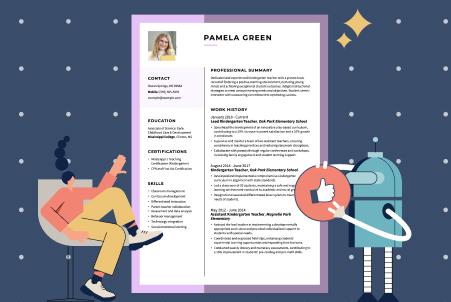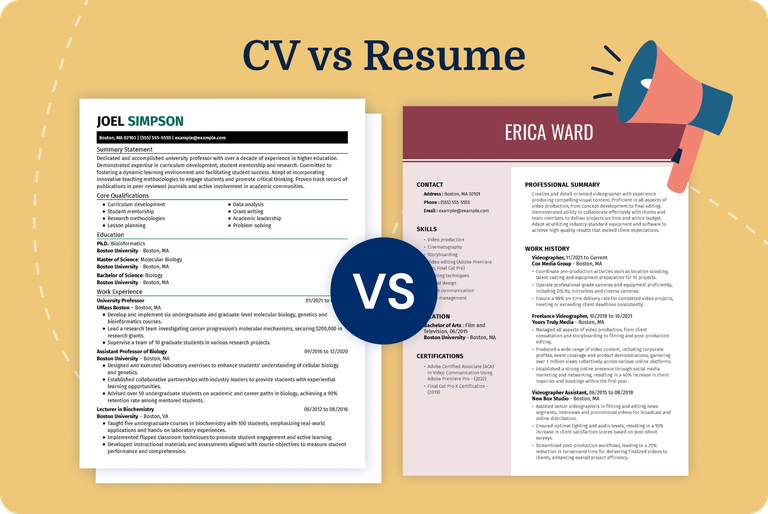Table of Contents
Get started with MyPerfectResume today!
- Build a resume on any device
- Pick an ATS-friendly template
- Tailor with AI copy suggestions
Why this resume works
- Quantifies accomplishments: By showcasing a 10% productivity increase and cost reduction of 20%, the applicant’s resume accomplishments effectively demonstrate their significant impact in laboratory settings.
- Highlights industry-specific skills: Skills like pathogen identification and microbial analysis highlight the applicant’s fit for healthcare roles, emphasizing industry relevance as seen in healthcare skills.
- Uses action-oriented language: Action verbs such as “led”, “optimized”, and “implemented” illustrate initiative and efficiency.
More Microbiologist Resume Examples
Discover microbiologist resume examples that offer great insights into highlighting your laboratory techniques, research skills, and scientific analysis expertise. Use these biology resume samples to craft a compelling resume that showcases your experience and passion for microbiology.
Entry-Level Microbiologist
Why this resume works
- Centers on academic background: The applicant’s education section showcases a solid foundation in microbiology that demonstrates their readiness for the role.
- Shows digital literacy: Applying tools like statistical analysis and laboratory protocols aligns with computer skills, showing adaptability to tech-driven scientific processes.
- Puts skills at the forefront: Structuring the resume with a clear focus on specialized skills such as microbial analysis mirrors the strategy of a skills-based resume format for impactful visibility.
Mid-Level Microbiologist
Why this resume works
- Points to measurable outcomes: Quantifiable outcomes like reducing error rates by 12% and improving sample processing time by 25% highlight a consistent focus on precision and efficiency in laboratory environments.
- Demonstrates language abilities: Fluency in Spanish, intermediate French, and basic German supports cross-cultural collaboration, aligning well with language skills for international research or diverse team settings.
- Displays technical expertise: Certified Microbiologist and Advanced Genetic Analysis credentials, paired with compliance expertise, reflect an advanced grasp of industry standards critical for scientific research roles.
Experienced Microbiologist
Why this resume works
- Showcases impressive accomplishments: By showcasing achievements like a 30% waste reduction and publishing in top journals, the applicant’s accomplishments reflect senior-level performance and significant business impact.
- Focuses on work history: A clear focus on work history is evident through the use of a chronological resume, highlighting extensive career experience across leading research institutions.
- Emphasizes leadership skills: Taking charge of projects such as initiating a cross-departmental microbiome study, the applicant exemplifies strong leadership skills and innovative team collaboration.
Microbiologist Resume Template (Text Version)
Jane Smith
Eastside, WA 98007
(555)555-5555
Jane.Smith@example.com
Skills
- Microbial Analysis
- Laboratory Techniques
- Pathogen Identification
- Data Analytics
- Bioinformatics
- Biological Assays
- Quality Control
- Technical Reporting
Languages
- Spanish – Beginner (A1)
- French – Intermediate (B1)
- German – Beginner (A1)
Professional Summary
Accomplished microbiologist with 4 years of experience in microbial analysis and pathogen identification. Known for optimizing lab procedures and publishing scientific papers. Expertise in laboratory techniques and data analytics.
Work History
Microbiologist
GenBio Innovations – Eastside, WA
January 2023 – June 2025
- Led 10% productivity increase in lab procedures
- Authored 5 scientific papers in peer-reviewed journals
- Developed a novel assay reducing costs by 20%
Research Scientist
BioLabs Corporation – Spokane, WA
January 2021 – December 2022
- Optimized microbial cultures improving yield by 15%
- Conducted 12 cross-departmental research projects
- Implemented biostudy cutting sample time by 30%
Lab Technician
HealthTech Solutions – Eastside, WA
January 2020 – December 2020
- Managed daily lab tasks, ensuring 100% clean ratings
- Assisted in 3 major scientific experiments monthly
- Digitized data entry reducing errors by 25%
Certifications
- Certified Microbiologist – American Society for Microbiology
- Laboratory Safety Certificate – National Science Foundation
Education
Master of Science Microbiology
University of California, Berkeley Berkeley, California
December 2019
Bachelor of Science Biological Sciences
University of California, Davis Davis, California
June 2018
Related Resume Guides
Advice for Writing Your Microbiologist Resume
Dive into our tips on how to write a resume for a microbiologist role and discover how to highlight your lab expertise, research experience, and passion for scientific discovery.
Highlight relevant technical skills
For a microbiologist, having strong technical skills is key to the job. These skills help in understanding and exploring microorganisms. It’s helpful to make a technical skills section on your resume, or you can list these skills under each job you’ve had before. This makes it easy for employers to see what you can do.
Some important technical skills for a microbiologist include lab techniques like PCR (polymerase chain reaction), microscopy, and aseptic techniques. Being able to use lab equipment properly and safely is also important. Sometimes, even knowing basic programming or using databases can come in handy when managing large sets of data.
When writing your resume, think about where you used these skills before. Did you work on any interesting projects? Maybe you helped solve a problem in the lab using one of these techniques. Sharing specific examples shows that you not only know the skills but have used them effectively.
Example of a technical skills section
- Microbiological techniques (aseptic technique, culturing, staining)
- Molecular biology tools (PCR, qPCR, gel electrophoresis)
- Bioinformatics software (BLAST, MEGA, Geneious)
- Microscopy skills (light microscopy, electron microscopy)
- Data analysis software (R, SPSS, Excel)
- Laboratory safety protocols
- Microbial identification and classification
- Environmental microbiology methods
- Antibiotic susceptibility testing
While technical skills are important, employers love seeing soft skills like communication, teamwork, and adaptability on your resume. You can use our AI Resume Builder to create a resume that highlights these skills.
Quantify your accomplishments
Quantifying accomplishments in a resume makes it stand out by showing what you have actually achieved, not just what you were supposed to do. In your work experience section, instead of saying “conducted experiments,” you could say “developed new testing methods that increased accuracy by 25%.” This gives a clear picture of your impact at work.
Using action verbs and specific metrics turns your resume into a story of success. Words like “increased,” “reduced,” or “improved” paired with numbers make it clear what you accomplished as a microbiologist.
Incorporating these elements into your work experience means hiring managers can easily spot how valuable you are. Numbers bring clarity to your skills and show the direct impact you’ve had in previous roles, making it easier for them to appreciate your contributions as a microbiologist.
5 microbiologist work history bullet points
- Conducted microbial analysis on 200+ environmental samples monthly, identifying contamination sources and improving safety protocols by 20%.
- Optimized lab workflows by introducing automated testing methods, increasing sample processing efficiency by 35%.
- Developed a novel bacterial strain identification method, reducing diagnostic time from 48 to 24 hours.
- Performed quality control checks for pharmaceutical products, ensuring compliance with FDA regulations and reducing batch errors by 15%.
- Collaborated with a cross-functional team to design antimicrobial resistance studies, leading to publication in a peer-reviewed journal.
Get great ideas for your resume by checking out professional resume examples. They show you how to make your skills and experience stand out.
Write a powerful professional summary
A professional summary or resume objective on resumes serves as an introduction to hiring managers, helping them quickly understand who you are and what you bring to the table.
A professional summary is a brief section that highlights your experience, skills, and achievements. It’s best for experienced applicants who want to showcase their professional identity and value right away. The purpose of a professional summary is to make a strong first impression by emphasizing what you’ve accomplished in your career.
Resume objectives, on the other hand, are statements about your career goals. They’re ideal for entry-level applicants, career changers, or those with employment gaps. While summaries focus on “what I’ve accomplished,” objectives highlight “what I aim to contribute” in the future.
Next, we’ll provide examples of both summaries and objectives tailored for different experience levels so you can see how they effectively communicate your potential as a microbiologist.
Microbiologist resume summary examples
Entry-level
Recent microbiology graduate with a Bachelor of Science in microbiology from a top university. Knowledgeable in lab techniques, including PCR and microscopy, and certified in biosafety level 2 practices. Eager to apply foundational skills in microbial analysis and contribute to research teams focused on innovative solutions.
Mid-career
Microbiologist with over five years of experience in clinical laboratory settings, specializing in pathogen identification and antimicrobial resistance testing. Proficient in using advanced lab equipment and developing protocols for sample analysis. Recognized for contributions to published studies on infectious diseases and strong collaboration with healthcare professionals.
Experienced
Seasoned microbiologist with expertise in molecular biology and environmental microbiology. Certified in microbial risk assessment and have led teams in large-scale research projects resulting in significant advancements in bioremediation techniques. Known for leadership abilities, strategic planning, and driving impactful scientific discoveries.
Microbiologist resume objective examples
Recent graduate
Eager recent Bachelor of Science in microbiology graduate seeking an entry-level microbiologist position to apply laboratory skills and knowledge of microbial techniques. Committed to contributing to innovative research projects and supporting advancements in the field of microbiology.
Career changer
Dedicated professional transitioning from environmental science into microbiology, with strong analytical skills and a passion for understanding microorganisms. Aiming to leverage interdisciplinary experience to assist in impactful research and development initiatives within a collaborative lab environment.
Specialized training
Aspiring microbiologist with specialized training in molecular genetics and microbial physiology seeking a role in a cutting-edge research facility. Excited to apply technical expertise and problem-solving abilities to contribute to pioneering discoveries in the study of microorganisms.
Select a clean and straightforward resume template that has clear sections for easy reading. Stay away from fancy fonts and excessive colors to keep the focus on your skills and experience.
Showcase your credentials
In the microbiology field, having certifications can help prove you understand important parts of the job. By making a certifications section in your resume, you highlight this expertise clearly. This section complements your education details and gives a full picture of your expertise.
- American Society for Microbiology (ASM) Certification
- Certified Clinical Microbiologist
- National Registry of Certified Microbiologists (NRCM)
- Biosafety Level Training Certification
- Good Laboratory Practice (GLP) Certification
These certifications help you stand out by showing you’re ready for the challenges in microbiology. They build trust with employers and give you an edge over others who might not have such credentials. Adding them to your resume can make a big difference in landing the job.
Example of a certifications section
Certified Microbiologist (NRCM)
Issued by: American Society for Microbiology
Issued 2022
Clinical Laboratory Scientist Certification
Issued by: American Society for Clinical Pathology (ASCP)
Expires 2025
Good Clinical Practice (GCP) Certification
Issued by: National Institutes of Health (NIH)
Issued 2021
Biotechnology Certificate
Issued by: American Institute of Biological Sciences
Expires 2024
Use a polished and professional resume format that aligns with your experience level to ensure your skills and qualifications stand out to hiring managers.
Salary Insights for Microbiologists
Knowing salary data helps people understand job market trends and what to expect in different careers.
Top 10 highest-paying states for microbiologists
Microbiologists earn varying salaries across the United States, with a national average of $84,047. The table below highlights the states where microbiologists command the highest compensation.
Our salary information comes from the U.S. Bureau of Labor Statistics’ Occupational Employment and Wage Statistics survey. This official government data provides the most comprehensive and reliable salary information for writers across all 50 states and the District of Columbia. The figures presented here reflect the May 2025 dataset, which is the most recent available as of this publication.
| State | Average Salary |
|---|---|
| Massachusetts | $119,850 |
| California | $115,910 |
| Maryland | $108,870 |
| Georgia | $103,880 |
| Montana | $100,700 |
| Virginia | $99,870 |
| New York | $94,660 |
| Nebraska | $94,960 |
| Minnesota | $93,380 |
| North Carolina | $92,260 |
FAQ
Do I need to include a cover letter with my microbiologist resume?
Yes, adding a cover letter to your microbiologist resume can really stand out.
A cover letter lets you highlight your interest in the role and organization, while also detailing your experience and skills in microbiology.
For example, if the company is involved in antibiotic resistance or environmental microbiology, you can talk about your background or passion in these areas.
Consider using tools like the Cover Letter Generator to create tailored cover letters based on your resume content or get guidance from scratch with expert tips.
It might also be helpful to check out cover letter examples for microbiologists to see how others effectively communicated their expertise and enthusiasm for similar roles.
How long should a microbiologist’s resume be?
For a microbiologist, a one-page resume is usually enough to showcase your key skills and experiences. Focus on technical expertise, lab techniques, and notable research projects or publications.
If you have extensive experience or specialized certifications like CLIA or CAP accreditation, a two-page resume can be fitting, as long as every detail adds value.
Make sure each section highlights recent roles or achievements in microbiology. Prioritize clarity and impact by tailoring content to fit the job description.
Check out our guide on how long a resume should be for tips on determining the ideal length for your career stage.
How do you write a microbiologist resume with no experience?
If you don’t have direct experience as a microbiologist, tailor your resume with no experience to highlight your education and skills that showcase your potential. Consider these tips for crafting an effective resume:
- Emphasize your education: Start with your degree in microbiology or a related field. Include your university, graduation date, relevant coursework, and any honors received.
- Include lab skills: Detail any laboratory skills gained during your studies such as PCR, microscopy techniques, or bacterial culturing. Mention specific equipment you’re familiar with.
- Highlight research projects or internships: If you’ve done any research projects or had internships related to microbiology during school, describe these experiences. Focus on what you did and the outcomes of the projects.
- List relevant coursework: Include classes that are particularly relevant to the role such as microbial genetics or immunology to demonstrate your foundational knowledge.
- Showcase transferable skills: Mention skills like data analysis, attention to detail, problem-solving abilities, and teamwork – all important for a microbiologist.
Tailor each section of your resume for the position you’re applying for. Customize it by using keywords from the job description to better align with what employers are seeking.
Rate this article
Microbiologist
Share this page
Additional Resources

The Illusion of Wage Growth: Where Paychecks Stretch the Farthest
U.S. wages have climbed at one of the fastest rates in modern history. Between 2020 and 2024, the average American worker’s pay rose from about $64,000 to $75,600, an 18%

100+ Resume Objective Statement Examples & Best Practices
In just a sentence or two, a resume objective statement tells hiring managers the role or career path you’re aiming for and the unique skills and value you bring to

150+ Skills for a Resume: Examples for Any Job
Crafting a standout resume starts with highlighting the skills and qualifications that demonstrate your fit for the role. But in a crowded job market, knowing which abilities will actually catch

When to Use a Two Page Resume (With Examples & Formatting Tips)
If you’ve spent years building your skills, growing in your career, and racking up accomplishments, a one-page resume might not cut it. A two-page resume gives you space to present a

How to Make an ATS Friendly Resume (Templates & Guide)
In today’s fast-paced hiring climate, many employers use applicant tracking systems (ATS) to organize, store, and screen candidate information. Optimizing your resume for ATS is essential for ensuring your application passes

CV vs Resume: What’s The Difference?
Confused about the difference between a resume and a CV? You’re not alone! While both documents help you land a job, they vary in content, structure, and formatting. In this guide, we’ll
